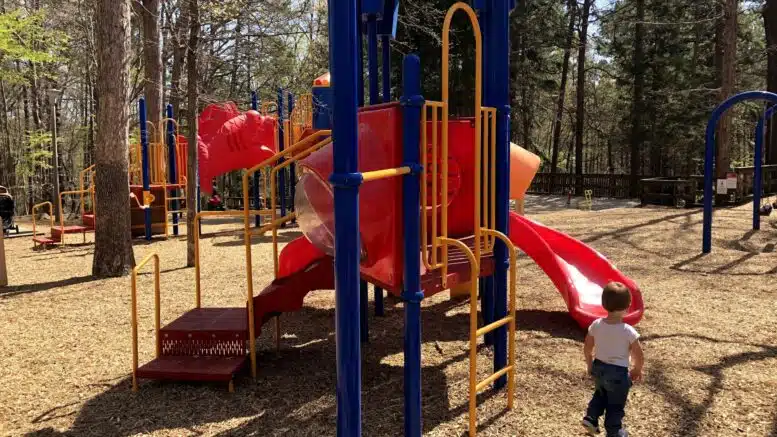By Grace Vitaglione
NC Medicaid costs fluctuate each year. The state Department of Health and Human Services forecasts how costs might change and asks the legislature for funding adjustments based on those predictions.
For the 2024-25 fiscal year, the department asked for almost half a billion dollars extra to meet higher costs — an adjustment known as the “rebase.” About $136 million of that is needed because the state will receive less money as federal reimbursement decreases for the program, according to DHHS.
But lawmakers left Raleigh last month without making a second-year budget adjustment. Without it, Medicaid funds could start running dry in the spring, Rep. Donny Lambeth (R-Winston-Salem) said.
Both the House and Senate’s proposed budgets would have given DHHS about $100 million less than they asked for, said Melanie Bush, deputy Medicaid director at DHHS.
The agency is counting on lawmakers to appropriate their proposed amount, likely in November, but that would still leave the department with that $100 million shortfall by the end of this fiscal year, in early 2025, she said.
Higher prices everywhere
The federal government typically pays about two-thirds of every dollar that North Carolina spends on regular Medicaid patients. In the coming year, that number is 65.06 percent of each dollar. That’s a slight tick down from prior years: Federal dollars accounted for 65.91 percent of the state’s costs for Medicaid beneficiaries in 2024. During the pandemic, that number was even higher, with the federal government picking up more than 73 percent of the tab from 2020 to 2023.
The percentages might seem small, but in a program as large as Medicaid, even a tenth of a percent of change can amount to millions of dollars.
(Beneficiaries of Medicaid expansion have 90 percent of their costs covered by federal dollars, while North Carolina’s hospitals are picking up the rest of the cost for those patients.)
People enrolling in the program, costly drugs, increased payments to managed care companies and increased services are some other factors in the rebase number, Bush explained.
The department also requested money to plan for moving people who are eligible for both Medicare and Medicaid into managed care, Bush said. In addition, funding is also needed for the NC Healthy Opportunities Program and to update the Medicaid Enterprise System — IT support for Medicaid and associated public benefits — according to DHHS.
Because state lawmakers failed to agree on a budget revision this summer, those requests weren’t met. The Medicaid program will be funded at the same level as last year’s budget.
That’s not enough, according to DHHS.
Bush noted that this doesn’t affect Medicaid expansion.
Trimming costs
To save money, DHHS could limit services or cut payments to managed care companies that administer the program, Bush said. But the department hopes to reduce administrative costs first, like large contracts with vendors and delaying IT infrastructure programs, she said.
DHHS “is working around the clock” to make sure individuals with Medicaid don’t see changes to what they’re receiving, Bush said.
“It is not our intention to cut services or limit anything that they may have access to today, but there are real life impacts to having an underfunded budget,” she said.
One such impact could be NC Healthy Opportunities pilots, in which people on Medicaid can receive food, transportation or housing services, Bush said. Plans for making that program statewide may have to go on a back burner, she said.
There was still some hope of funding until recently, she said.
“This is the first year that they’re really just not funding even close to the level that we’ve requested,” Bush said.
Cutting Medicaid reimbursement rates to providers would be unpopular, as health care is a huge part of the state’s economy, said Adam Searing, associate professor at the Georgetown University McCourt School of Public Policy’s Center for Children and Families.
“No one wants to say we’re cutting payments to rural hospitals,” he said.
Health care costs usually increase every year, Searing said. When making a responsible budget, lawmakers have to anticipate that, he said.
Budget hopes dashed
These types of Medicaid budget shortfalls aren’t supposed to happen anymore.
In 2015, state lawmakers pushed through changes to Medicaid that mandated the program to make a switch from being state-run to being managed by large insurance companies.
So, North Carolina made the switch in 2021 from a fee-for-service regimen, where Medicaid pays for every doctor visit, test and therapy session, to managed care, which pays a monthly amount for each beneficiary and then the big insurers need to stay within budget to provide all the care for beneficiaries. Lawmakers argued that one of the stated reasons for that switch was for “budget certainty,” where they could predict at the beginning of the year what Medicaid’s spent, rather than chasing cost overruns.
But if enough money isn’t appropriated, shortfalls will happen.
There is a pot of money set aside for situations such as this one, when the Medicaid program needs less or more money than expected. That’s called the Medicaid Contingency Reserve, and it currently holds about $250 million in nonrecurring funds, according to DHHS. Lawmakers have to appropriate that money for DHHS to be able to use it.
But lawmakers would rather not use that money unless they have to, Searing said. It’s likely legislators will appropriate some money to keep Medicaid upright before next session, he said.
“The political consequences of not adequately funding the Medicaid program are huge,” he said.
Rep. Larry Potts (R-Lexington) said that in budget negotiations, the House wanted to use money from the reserve while the Senate did not. Managed care providers may have to “share some of the pain” by reducing administrative costs if legislators don’t pass any funding for DHHS, he said.
Medicaid could run out of money in spring 2025 if it grows at the rate expected, Lambeth said in an email. But the legislature would be back in session then, he said.
Lambeth said there are currently no plans for legislators to go back to Raleigh and work on the budget. There are some “must do” items they could address in November, but that’s still up in the air, he said.
In the meantime, DHHS can’t rely on that hope, Bush said.
“We don’t have a guarantee that the legislature will come back and pass another budget in spring, and so we simply can’t just run out the budget and hope that they save us,” she said.
Planning ahead for children in foster care
Without the requested funding, DHHS may have to delay the Child and Families Specialty plan, which was supposed to roll out in December 2024. It’s still a priority, but one that has to be weighed among others, Bush said.
The long-sought plan would consolidate children in foster care across the state under one Medicaid plan run by one managed care company. Currently, the services those children can receive depends on which counties they live in and which local mental health managed care organization (known as LME-MCOs) provides services in those counties.
That means children can receive widely divergent services depending on where they live, so the statewide plan intends to provide consistent, equitable services for children in the welfare system, said Karen McLeod, who runs Benchmarks, an umbrella nonprofit organization that advocates for groups that provide care for children and families.
Children have to receive services from providers credentialed by the LME-MCO in their region. So for children being fostered with a relative who lives outside of their home LME-MCO’s catchment area, it can be difficult to access services, McLeod said.
Creating one statewide plan could help address that.
In the second year of the new plan’s rollout, the families of children who are at risk of being taken into foster care would also be able to access Medicaid, said Gaile Osborne, executive director of Foster Family Alliance of NC. Currently, only the child can access Medicaid in that situation, she said.
In many cases, supporting the family as well as the child helps keep the family together, Osborne said. For example, helping a parent address their substance use issues could prevent the child from having to go into foster care.
“We’re breaking families up, or we’re putting them together, and that’s how big this lift is,” she said.
The department is still in a bidding period for the company that will administer the plan, according to McLeod. The December deadline would have already been a tight turnaround, but not having this funding “pretty much confirms” the plan won’t roll out on time, she said.
If DHHS has to delay because of a lack of funding, the momentum around putting this plan together could fall apart, McLeod said. A new governor in the fall will also mean a changeover in the department and possible further delays, she said. Or the new administration might not see it as a priority.
Osborne said she hopes that will mean more time to learn from any stumbling blocks in the tailored plans that rolled out July 1. Until then, there will be no change for children and families involved with child welfare, she said.
Rose Hoban contributed to reporting on this story.












